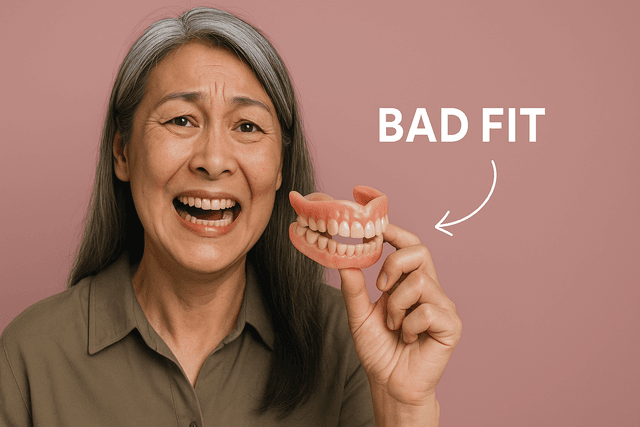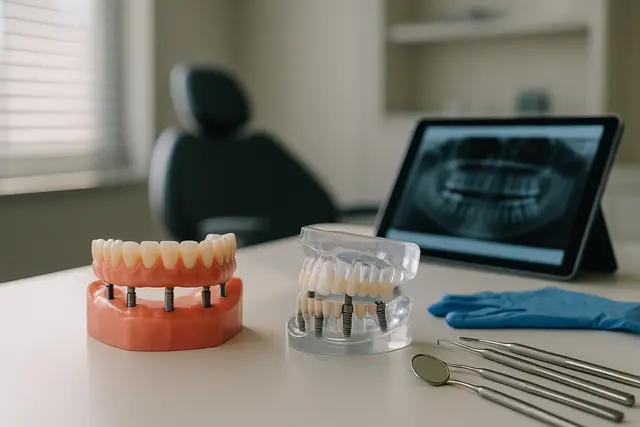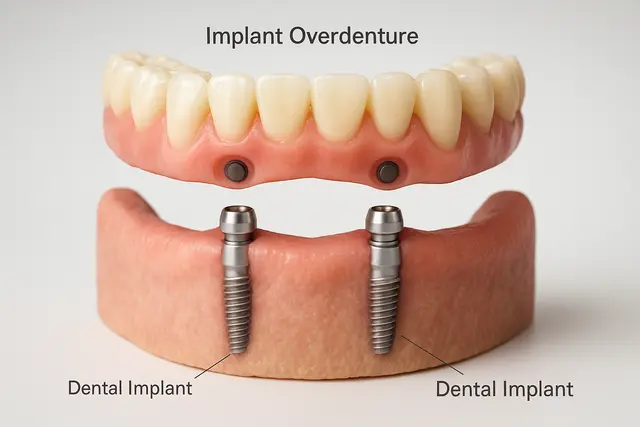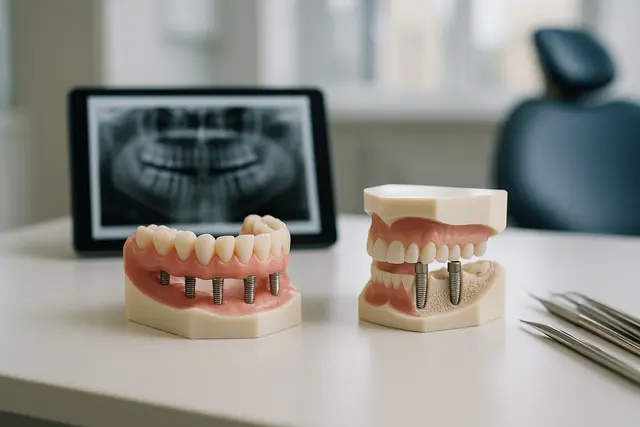Prosthodontics
5 min read
Sep 23, 2025
Bad Fitting Dentures: How to Correct Them and Restore Function
Dentures are meant to restore comfort, confidence, and function, but when they don’t fit properly, they can cause far more problems than they solve. From sore gums to difficulty eating and speaking, bad-fitting dentures affect daily life and even long-term oral health.

If you've ever had a pebble in your shoe and kept walking anyway, then you know how something small can mess up your whole day. Now imagine that annoying pebble lives in your mouth. That’s what bad fitting dentures feel like, and it’s not just annoying. Ill-fitting dentures can affect how you eat, talk, smile, and live your life. So let’s talk about how to fix bad fitting dentures, restore function, and yes, finally ditch the discomfort for good.
Denture Troubles Aren’t Just a Minor Inconvenience
When dentures don’t fit properly, everything becomes a challenge. You might notice they move around when you talk. You might avoid steak night because chewing is no longer your strong suit. Or maybe you’ve just started wearing dentures and thought, "This can’t be normal." Spoiler: it’s not.
Dentures are supposed to stay in place, fit comfortably, and allow you to eat most foods without fear of slippage or soreness. But if your dentures feel loose or cause sore spots, it's likely time to reassess the denture fit. Bad-fitting dentures don’t just mess with your meals, they can mess with your confidence and oral health, too.
Ill-Fitting Dentures Can Wreck More Than Your Dinner
Here’s where things get serious. Ill-fitting dentures may also cause discomfort that goes beyond a little rubbing. We’re talking about actual health issues.
When dentures rub against the gums or sides of your mouth, they can lead to painful mouth sores, inflammation, and even a condition called stomatitis. They can also trigger bone loss in the jawbone, especially when the lower denture doesn’t fit snugly.
Let’s not forget the domino effect: sore gums can lead to changes in the way your dentures fit, which leads to more irritation, which leads to you tossing your denture in a drawer and avoiding your dentist like they’re your high school ex.
Denture Fit Should Be Comfortable, Secure, and Functional
Dentures should feel like a natural part of your mouth, not like a foreign object plotting against you. When your dentures fit properly, you should be able to eat, speak, and laugh without fear that they’ll slide out or feel bulky in your mouth.
But the way your dentures fit isn’t just about initial measurements. Your gums and jawbone can change over time, especially after tooth loss. So even if your new denture started out as a perfect match, it might not stay that way forever.
Your Dentist Is Your Denture's Best Friend
Here’s a friendly nudge: see your dentist. No one is better equipped to assess denture problems and help you restore your comfort and confidence.
If dentures continue to feel off, your dentist can perform a denture reline, which reshapes the underside of your denture for a more secure fit. Think of it like tailoring a suit after a few years, it helps everything sit right again.
You may also need your dentures adjusted or replaced entirely, especially if they’ve become warped, cracked, or worn down. Sometimes, a full remake is less trouble than endlessly fixing something that no longer works.
Denture Problems Can Sneak Up on You
So how do you know if you're dealing with poorly fitting dentures? Keep an eye out for these signs of ill-fitting dentures:
Sore or irritated gums
Frequent use of denture adhesive just to keep them in
Difficulty eating or speaking
Dentures that move around or feel loose
Clicking sounds when you talk
Food getting trapped under the denture
Red patches or signs of stomatitis
If these sound familiar, your dentures need to be adjusted.
Caring for Your Dentures Makes All the Difference
Don’t ignore your denture care and maintenance routine. To help them fit well for as long as possible, you need to clean your dentures thoroughly every day and keep your mouth clean. Remove your dentures at night to let your gums rest and reduce irritation.
Also, use denture adhesive sparingly. While denture adhesive can help with short-term stability, it’s not a fix for dentures that don’t fit properly. In fact, over-relying on adhesive might mask a real problem and delay necessary care.
Dentures May Need to Be Relined or Replaced
If your dentures feel loose or cause sore spots regularly, that’s a red flag. Dentures may need to be relined, especially after significant weight loss, jawbone changes, or gum shrinkage. A reline improves the fit of your dentures without needing to make an entirely new set.
But sometimes, relines just won’t cut it. If your dentures are loose beyond repair or keep giving you problems, they may need to be adjusted or replaced completely. This is especially common with lower dentures, which are notoriously harder to fit due to less surface area for suction.
Fix Ill-Fitting Dentures With the Right Solutions
No one should suffer through ill-fitting dentures. If your dentures don’t fit, you’ve got options.
Start by scheduling an appointment with your dentist. They’ll evaluate the fit of your dentures and recommend what’s next. It could be a reline, an adjustment, or a completely new denture. And in some cases, your dentist may recommend dental implants or implant-supported dentures for a more stable, long-term solution.
Implant-supported dentures stay in place securely, which means no more slipping or surprise shifts during dinner. For many denture wearers, switching to implants has been life-changing.
Dentures Are Loose? Time to Act
If your dentures start to feel loose, don’t ignore it. Even if you’ve only had them for a short while, they may need to be adjusted or relined. And if you’ve just started wearing dentures, some initial discomfort is normal, but it shouldn’t last long.
A proper fit isn’t just about comfort. It’s about health, dignity, and living your life without worrying about your teeth taking a field trip during lunch.
Dentures May Need Adjustments More Than Once
Just like eyeglasses, dentures may need occasional tuning. The fit can change with age, gum and bone changes, and daily wear and tear. Dentures may need to be adjusted every few years, or sooner, depending on your situation.
Keep your dentures in good shape by maintaining regular checkups. This helps catch issues before they become painful or expensive problems. Plus, your dentist can catch early signs of gum issues or bone loss, which can affect how your denture fits over time.
Don’t Let Loose Dentures Rule Your Life
Bad-fitting dentures aren’t something you should just “put up with.” The discomfort, the difficulty eating, the sore spots, they’re not part of the package deal. Whether it’s a simple reline, a new set of dentures, or upgrading to dental implants, there are solutions that can restore your comfort and confidence.
Make sure your dentures fit properly. Take action when they don’t. And remember: a good denture should help you smile, not give you something to frown about.
What Are the Common Signs of Ill-Fitting Dentures?
Poorly fitting dentures can cause sore or irritated gums, clicking sounds when speaking, food getting trapped underneath, or frequent slipping when chewing. You may also find yourself relying heavily on denture adhesive just to keep them in place. These are clear signs that your dentures need to be adjusted, relined, or possibly replaced.
How Can Bad-Fitting Dentures Affect Oral Health?
Ill-fitting dentures don’t just cause discomfort, they can also lead to serious health issues. Constant rubbing may result in painful mouth sores, inflammation, or stomatitis. Over time, poorly fitting dentures can contribute to jawbone loss, which makes achieving a secure fit even harder and may worsen your overall oral health.
What Solutions Are Available for Loose or Uncomfortable Dentures?
Dentists can adjust or reline dentures to improve their fit. A reline reshapes the underside of the denture to match changes in your gums or jawbone. In cases where dentures are too worn or damaged, a new set may be recommended. For long-term stability, many patients consider implant-supported dentures, which stay securely in place and feel more natural.
How Should Dentures Be Cared For to Maintain a Good Fit?
Daily cleaning is essential to keep dentures free of bacteria and food buildup. Remove them at night to give your gums a rest and prevent irritation. Use denture adhesive sparingly, since overuse can mask fit problems. Regular dental checkups are also important to catch early gum or bone changes that may affect how your dentures fit.
Read Next
Related Posts

Prosthodontics
Implant Supported Dentures Overview
Missing teeth can impact more than just your smile, they can affect your confidence, comfort, and even your diet. Fortunately, modern dentistry offers a solution that’s both secure and natural-looking: implant-supported dentures. This innovative approach blends the stability of implants with the convenience of dentures to create a long-lasting, life-improving upgrade.
5 min read
Oct 29, 2025

Prosthodontics
Implant Overdentures Explained: The Hybrid Solution to Missing Teeth
Missing teeth can impact everything from your ability to eat to your self-confidence. While traditional dentures have long been a go-to solution, they often fall short in comfort and stability. Implant overdentures offer a modern alternative that combines the security of dental implants with the convenience of removable dentures, a true upgrade for those looking to reclaim their smile.
6 min read
Oct 29, 2025

Prosthodontics
Implant Retained Dentures Explained
Considering implant-retained dentures? You're not alone. As modern dentistry evolves, more people are turning to this secure, natural-feeling alternative to traditional dentures. This guide will walk you through what they are, how they work, and why they might be the solution you've been looking for.
4 min read
Oct 28, 2025
Don’t have time to research every dentist around you?
See why 30k+ patients trusted us